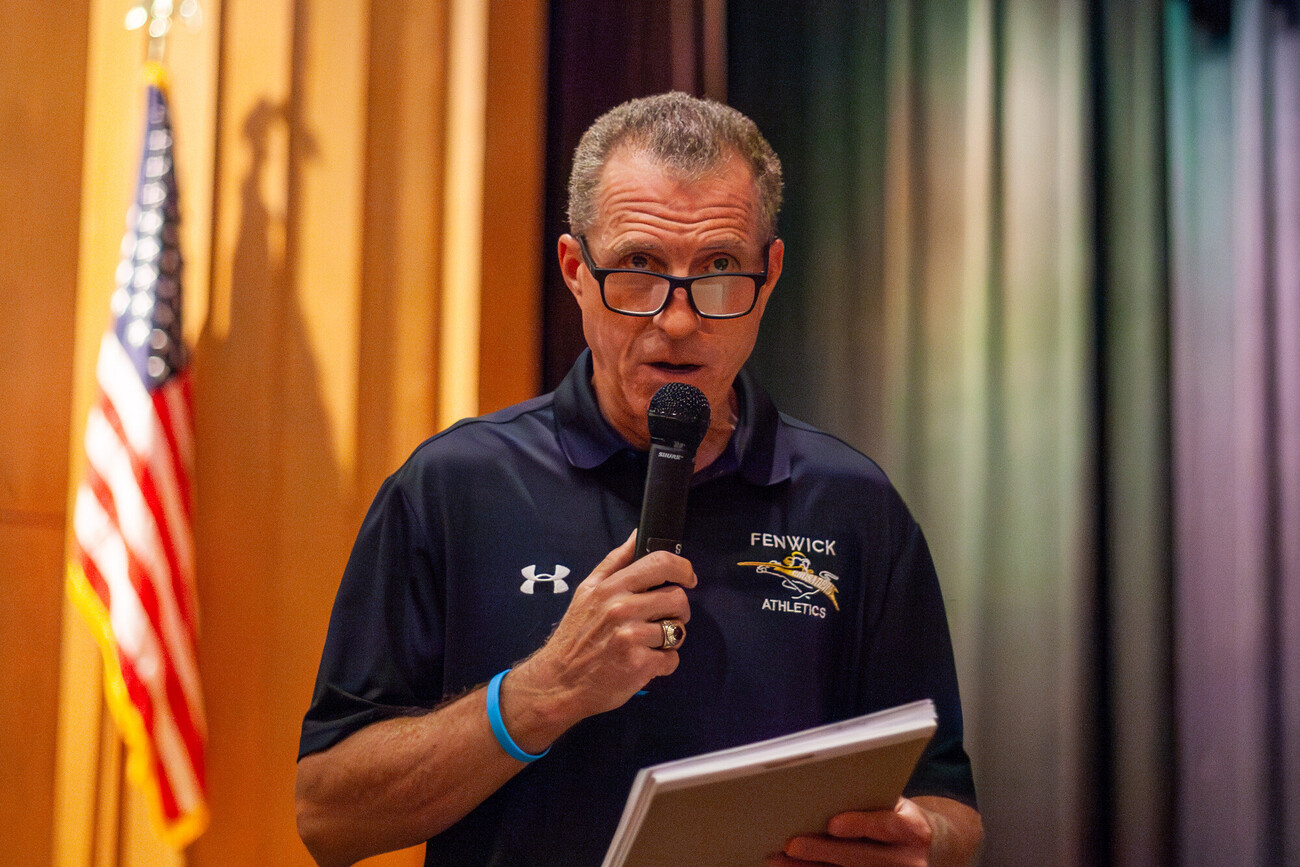PEABODY — Bishop Fenwick High School is fighting back against the Massachusetts Interscholastic Athletic Association’s decision barring all Crusaders athletic teams from participating in postseason tournaments.
On Friday, Fenwick’s attorney, Leo S. Fama II, filed a verified complaint and an emergency motion for a preliminary injunction against defendant MIAA in Salem Superior Court. He said that the complaint was served to the MIAA at 3:30 p.m. the same day.
The complaint aims to “correct errors in MIAA proceedings” and seeks “judicial review of the proceedings before the MIAA to date and any subsequent proceedings before the MIAA after the filing of this instant action.”
The accompanying motion seeks to “enjoin and restrain defendant (MIAA), their agents, servants, employees, and attorneys from enforcing a ban preventing all of plaintiff’s (Fenwick) from participating in postseason tournament competition during the current school year, 2023-24.”
Fama said the court has scheduled a hearing on the motion for Monday, Oct. 16 at 2 p.m. in Newburyport.
“This is Bishop Fenwick’s action to support the well-being of the student-athletes to underscore the dedication the school has provided every year since its inception,” Fama said. “The real issue here is that the MIAA board does not get regulated by anyone. Everywhere in the state you always have somebody to answer to, but the MIAA does not have anybody to answer to or a regulatory body that people can go to for relief. We have laws in this state like Massachusetts General Laws Chapter 30A that provides oversight and regulation for traditional and quasi-judicial boards, but the MIAA is its own judge, jury, and executioner. We live by whatever rulings they are making with no recourse whatsoever and as a result, it’s the students who suffer.”
In a statement released to the Fenwick community, Fenwick President Thomas Nunan said the following:
“The Board at Bishop Fenwick is taking this action to support the well-being of our student-athletes and to underscore its dedication to providing a positive experience for all members of our Fenwick community. The Board affirms and upholds the integrity of our school, and with the school’s administration, is deeply committed to the young people entrusted to our care. We remain hopeful that a fair and just resolution to this unfortunate situation can be reached for all parties concerned. Because the matter is now in litigation, the school is not able to comment further at this time.”
The MIAA did not respond to a request for comment about the lawsuit.
The complaint summarized the facts regarding alleged rules violations on the part of Fenwick concerning students from St. Mary’s of the Annunciation School in Danvers, who allegedly participated on Fenwick sports teams without MIAA waivers. The MIAA determined that Fenwick had violated two MIAA rules, that the students in question had been ineligible to play for the school, and that the school had to forfeit all games in which those students participated. An appeal to the MIAA Board of Directors was denied and Fenwick was ordered to forfeit any such games and remove all St. Mary’s students from its teams. Fenwick was also notified that St. Mary’s students “are not permitted to participate in interscholastic athletics at Bishop Fenwick under any circumstances.”
The complaint also laid out the facts concerning “AM,” a baseball player at Fenwick whose waiver request was denied by the MIAA. A subsequent appeal was denied by the MIAA, which cited that “this appeal process has been riddled with contradictory and misleading information and a severe failure on Bishop Fenwick’s part to do its due diligence before filing a waiver application.”
The MIAA Board of Directors conducted a hearing on May 17 to discuss Fenwick’s alleged rules violations. It determined that Fenwick’s conduct was “sufficiently serious, egregious, and repeated” to warrant imposition of a postseason ban under the MIAA’s Accountability Rule 87.6.
The complaint contends that the MIAA’s decisions denying Fenwick’s appeals are “arbitrary, capricious, and an abuse of discretion,” and that Fenwick has “exhausted” its administrative remedies. Count one, a request for declaratory judgment, asks the court to declare that “Chapter 30A applies to all matters heard by the MIAA,” that the ban is “void for lack of due process,” and that the sanctions imposed by the MIAA are “inappropriate and excessive” because there is no “right of review.”
Count two seeks injunctive relief to annul all sanctions, grant a preliminary injunction preventing enforcement of the postseason ban, and, following a full court hearing, grant a permanent injunction.
Count three alleges a breach of contract on the part of the MIAA for imposing the ban “without giving the school due process.”
Count four alleges that the MIAA is guilty of “tortious interference with contractual or advantageous relationships.” The complaint states that the “MIAA caused students to withdraw and (transfer)” and that the MIAA’s interference with contracts between students and Fenwick has resulted in “economic harm.”
“The reality is that this case will bring light to a lot of things that I’ve been talking about for years,” Fama said. “When you get a parking ticket, you have a right to appeal the hearing decision to the Superior Court under Chapter 30A. It’s just my opinion that the lives of these children are far more important than a parking ticket.
“Fenwick has already been punished for all of this,” Fama said. “What did the students have to do with the gripes the MIAA had with administrators? Punish them, not the kids. They should be advocating for kids, not hurting them.”

